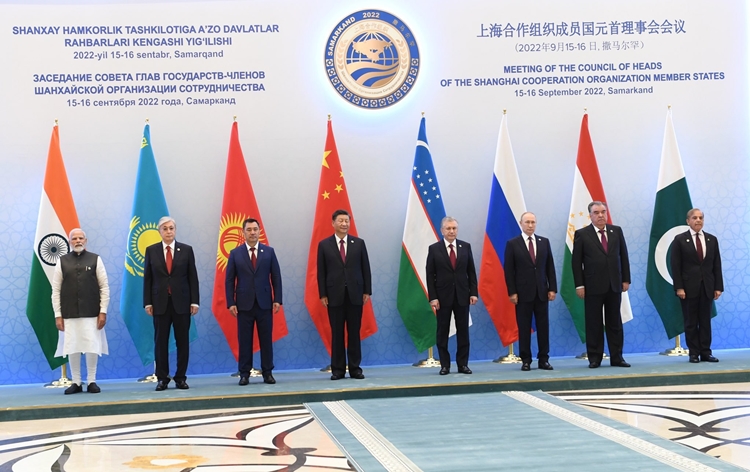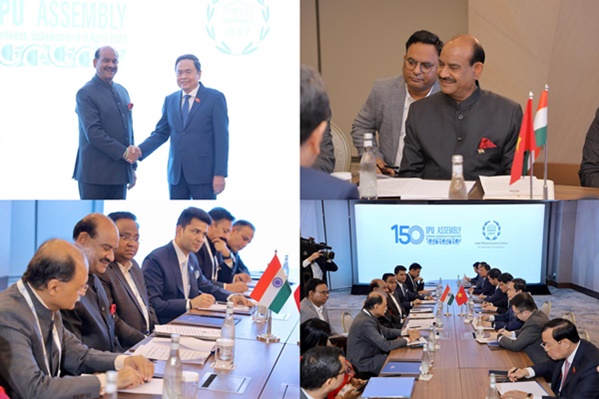India takes over SCO rotating presidency, to host SCO summit next year
Sat 17 Sep 2022, 11:37:32

The rotational presidency of the Shanghai Cooperation Organization has been handed over to India in Samarkand, Uzbekistan yesterday. Delhi will hold the presidency of the grouping for a year until September 2023. And next year, India will host the SCO summit.
The leaders of the Shanghai Cooperation Organization (SCO) Member States signed the Samarkand Declaration in the meeting of the Council of Heads of State in the city of Samarkand, Uzbekistan yesterday. In the declaration, it is stated that the presidency of the SCO for the forthcoming period passes to India. The next meeting of the SCO Council of Heads of State will be held in 2023 in India.
During the SCO Summit, the Member States noted the various global challenges and threats including technological and digital divide, continued turbulence in global financial markets, instability in supply chains, increased protectionist measures and uncertainty in the global economy.
Member States also highlighted the impacts of global climate change and the ongoing COVID-19 pandemic which posed additional challenges to economic growth, social well-being and food security. The leaders stressed on the need of adopting new approaches to promote more equitable and effective international cooperation and sustainable economic development.
In the Samarkand Declaration, the member states supported the efforts of the countries of the region to ensure prosperity, peace and sustainable development. They advocated strengthening the role of SCO in enhancing stability and socio-economic development in the region.
The Member States expressed deep concern over the security threat posed by terrorism, separatism and extremism and strongly condemned terrorist acts around the world. They reaffirmed the commitment to fight terrorism, separatism and extremism.
They also resolved to take measures to check the spread of terrorism, cut off terrorist financing channels, suppress terrorist recruitment and cross-border movement, radicalization of youth, spread of terrorist ideology, elimination of sleeper cells and places used as terrorist safe havens.
The leaders underlined the role of SCO Regional Anti-Terrorist Structure in combating terrorism, separatism and extremism.
The Member States will seek to develop common principles and approaches to
form a unified list of terrorist, separatist and extremist organizations whose activities are prohibited on the territories of the SCO member states.
form a unified list of terrorist, separatist and extremist organizations whose activities are prohibited on the territories of the SCO member states.
On the Afghanistan situation, the SCO Member States believed that one of the most important factors in preserving and strengthening security and stability in the SCO region is the speedy settlement of the situation in Afghanistan.
They supported the establishment of Afghanistan as an independent, neutral, united, democratic and peaceful State, free of terrorism, war and drugs.
Emphasizing on enhanced connectivity in the region, the Member States pointed out that the ongoing efforts to enhance connectivity between Central Asia and South Asia would ensure prosperity and security in the SCO region.
On the economic and trade front, Member States called for strengthening the effectiveness of WTO as the key forum for discussing the international trade agenda and adopting the rules of the multilateral trading system.
They emphasized the need for early and inclusive reform of the organization. Member States are in favour of encouraging regional economic cooperation in various forms, promoting an enabling environment for trade and investment with a view to achieving progressive free movement of goods, capital, services and technology.
Member States have decided to establish a Special Working Group on Start-ups and Innovation, Special Working Group on Poverty Reduction and an Expert Working Group on Traditional Medicine. They also reaffirmed their commitment to cooperate in the digital economy and support the development of digital technologies.
The Member States also made commitments to build a sustainable economic system by promoting green and environmentally friendly technologies.
They recognized that lack of access to safe drinking water, basic sanitation and healthy hygiene are major challenges and stressed on the need to focus on sustainable development and water management.
In the Agriculture sector, Member States, taking into account a number of challenges facing the development of agriculture within the production cycle, Member States have advocated the introduction of modern technologies and active cooperation in the field of food security.
No Comments For This Post, Be first to write a Comment.
Most viewed from Specials
Most viewed from World
AIMIM News
Latest Urdu News
Most Viewed
May 26, 2020
Do you think Canada-India relations will improve under New PM Mark Carney?
Latest Videos View All
Like Us
Home
About Us
Advertise With Us
All Polls
Epaper Archives
Privacy Policy
Contact Us
Download Etemaad App
© 2025 Etemaad Daily News, All Rights Reserved.






















.jpg)
.jpg)
.jpg)

















